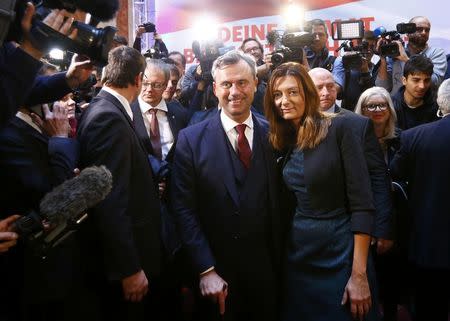Far right has second chance in Austrian presidential election
By Francois Murphy VIENNA (Reuters) - Austria will provide a new gauge of the populist wave sweeping Western democracies on Sunday, as the divided country holds a vote that could deliver the first freely-elected far-right head of state in Europe since World War Two. The knife-edge presidential run-off is all the more dramatic for being a re-run of an election held six months ago - before Britain chose to leave the European Union and Americans elected Donald Trump as president - offering an indication of whether popular anger at the political establishment has grown. When Norbert Hofer of the anti-immigration Freedom Party (FPO) narrowly lost the original run-off in May with 49.65 percent of the vote, European governments breathed a sigh of relief. Far-right parties like France's National Front, however, cheered the record performance. Opinion polls suggest the race remains too close to call and could again come down to postal ballots, meaning the final result might come as late as Tuesday. The first projections are due shortly after polling stations close at 5 p.m. (11.00 a.m. ET). What influence Trump and Brexit have had on Austria is unclear, but the fault lines are similar - blue-collar workers have largely backed Hofer, the highly educated favor his opponent, former Greens leader Alexander Van der Bellen. Van der Bellen, 72, has put Brexit at the heart of his campaign, arguing that Hofer wants Austria to hold its own "Oexit" referendum, putting jobs at risk in the small, trade-dependent country. "Let us not play with this fire. Let us not play with Oexit," Van der Bellen said in their last televised debate, referring to the fact Hofer initially said Austria could hold its own referendum within a year before backing down. A Hofer win would raise the prospect of two near-simultaneous blows to Europe's political establishment. Italy is holding a referendum on Sunday on constitutional reform that polls suggest Prime Minister Matteo Renzi will lose. Austria's president traditionally has a largely ceremonial role, but Hofer has made clear he wants to be an interventionist head of state, threatening to dismiss a government if it raises taxes and calling for referendums on a range of issues, even though referendums are beyond the job's remit. "You will be amazed at what will be possible," Hofer, 45, said in April when asked about the president's powers. The president also plays an important part in forming coalitions. Van der Bellen has said he would try to prevent an FPO-led government even if it won an election. The FPO is running first in polls with support of roughly a third of voters, with parliamentary elections due in 2018. BANANA REPUBLIC Austria has for decades been dominated by two centrist parties that are once again in coalition, and anger at that entrenched duopoly has fueled support for the far-right FPO, which says it wants to end the two parties' grip on power. The country, which stretches from Slovakia to Switzerland and borders Germany, was swept up in Europe's migration crisis last year, stoking unease among many voters already concerned about globalization and rising unemployment, playing into the FPO's hands. Whatever the outcome, weary Austrian voters hope it will at least bring to an end an election that has dragged on for almost a year after a comedy of errors that prompted some Austrian media to call the country a "banana republic". The result of the May 22 run-off was overturned because of irregularities in the count of postal ballots, mostly due to election officials cutting corners as they raced to complete the count. The re-run was then postponed because the glue on the envelopes for some postal ballots did not stick. Officials are this time aiming to do everything by the book, in the hope that a small delay to the result prevents bigger problems down the line. (Editing by Toby Chopra)


